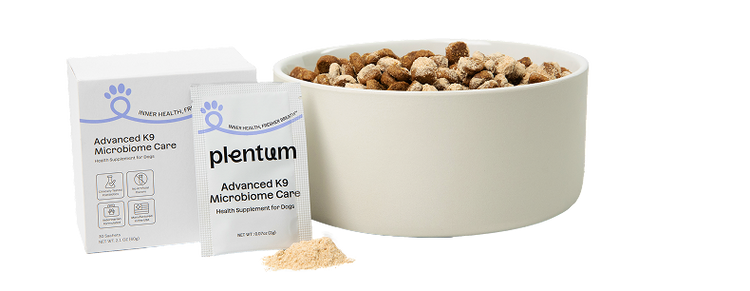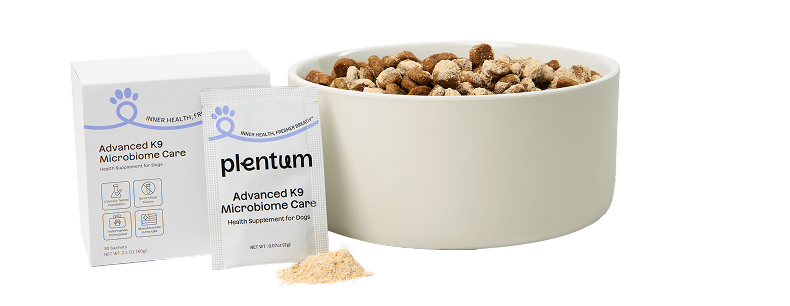
Unlike humans, dogs don't have high-end tastes. Their tendency to eat first and then react might easily backfire on them. That's when the symptoms start to show, from sudden changes in appetite and weight, skin and coat issues, and digestive problems like vomiting and diarrhea. These are all symptoms of poor gut health in dogs, and it can’t be ignored.
Understanding the Signs of Poor Gut Health in Dogs
Understanding the symptoms of poor gut health in dogs is critical for overall wellness and lifespan. Dysbiosis is a common cause of poor gut health. Trillions of bacteria, viruses, and other microorganisms make up your dog's gut microbiome. Through a process known as the gut-brain axis, these microbes facilitate the breakdown of food, combat harmful pathogens, and even influence mood and behavior. Inflammation, low energy, or digestive distress are some of the signs of poor gut health that can occur in dogs when this delicate balance is upset, a condition known as dysbiosis. The long-term health and immunity of your dog depend on maintaining this microbial balance.1
In this guide, we'll help you understand these symptoms.
7 Symptoms of Poor Gut Health in Dogs

- Diarrhea: If your dog has ever had diarrhea, you understand how stressful it can be for a pet parent. Diarrhea can make your dog uncomfortable, thirsty, and prone to nutritional deficiencies. It often happens when there are sudden changes in diet.
- Vomiting: Many minor cases of vomiting in dogs can be treated with a bland diet of chicken, rice, white fish, or scrambled eggs and small, frequent meals. However, frequent vomiting may indicate digestive tract inflammation or trouble absorbing nutrients, both of which are common in dogs with compromised gut health.
- Changes in Appetite: A notable drop in appetite may indicate an upset stomach, but it could also indicate that something is wrong with your dog's health.
- Gaining or Losing Weight: If your dog's weight changes without any obvious reason, especially if your dog's diet stays the same, it could mean that their gut isn't absorbing nutrients properly.
- Skin and Dull Coat Problems: Skin and coat problems are linked to gut imbalance. Your dog's skin and coat frequently reveal what's going on inside. If the gut is out of balance, you may notice dryness, itching, excessive shedding, or a dull, lifeless coat.
- Excessive Bloating and Gas: Excessive gas, together with bloating, represent two well-known signs of digestive disorders in dogs. The fermentation of partially digested food inside the stomach produces these symptoms.
- Tiredness and Changes in Behavior: The body needs vital nutrients to function yet fails to absorb them, which results in an energy deficiency. The lack of essential nutrients causes your dog to feel exhausted while losing interest in their usual activities.
Understanding Gut Health Science in Dogs
The digestive system of dogs contains millions of beneficial bacteria that serve essential functions for digestion, immunity, and mood regulation. Medical professionals treat this complicated ecosystem through antibiotic therapy alongside probiotic administration and fecal transplant procedures. Scientists are currently exploring optimal treatment methods for gastrointestinal disorders; however, research demonstrates that regular microbiome nourishment produces significant health benefits for dogs.1
How can you improve your dog’s poor gut health? Why is it important?

The overall health of your dog along with their digestive system, immune system, and behavioral state depends on having a balanced gut microbiome. The medical treatment of gut diseases includes fecal transplants together with probiotics and antibiotics.
- Nutrition: Feeding your dog nutritious food with fiber, natural prebiotics, and appropriate protein sources will promote gut health along with good digestion.
- Exercise and Stress Management: Exercise regularly while managing stress levels because physical activity supports digestive processes, while stress reduction helps prevent microbiome imbalances that cause behavioral problems or anxiety.
- Hydration: Drinking enough water helps maintain both gut health and digestive system operation. Maintain your dog's digestive system through the consumption of plenty of water.
Final thoughts on dog’s gut health
The condition of poor gut health leads to general health deterioration, which results in a reduced quality of life. Stomach issues occur frequently among dogs because stomach problems are a normal occurrence for most canines. The scientific community has established a clear link between canine health and the gut microbiota composition. The gut microbiome stays stable in typical adult dogs yet becomes unstable because of aging processes as well as food choices and environmental factors. The microbial community disturbances known as dysbiosis reach significant levels in ill dogs, while they fail to recover completely after symptoms disappear. The permanent state of microbial imbalance remains, without full comprehension regarding its lasting impacts. The diagnosis and treatment methods for gut bacteria diseases will advance through future research about the bacteria's illness-related functions.
Providing good gut health to your dog will result in a happy companion who can fully participate in activities such as walks and playtime. Good care of the gut environment leads to peacefulness, which results in happiness. Consult your veterinarian whenever your dog demonstrates signs of bad gut health.





